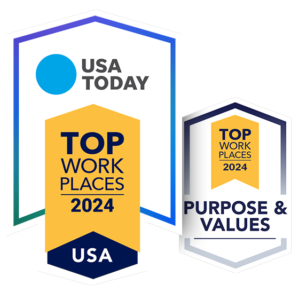Erie Family Health Centers’ Research Team collaborates with Erie’s patients, staff, providers, and partner institutions to improve access to quality care, promote best-practices, and ensure our communities are represented in medical advancements.
Research at Erie is viewed as an additional mode in which we support our patients and enhance the high-quality care we provide. We believe engagement in aligned research helps us improve the individual health of our patients, maintain focus on continuous improvement, and contributes to making advancements towards health equity.
Erie sets high standards for the quality, purpose, and relevance to the communities Erie serves when evaluating research opportunities. Specifically, Erie prioritizes participation in research initiatives that acknowledge and address sustainability and replicability in a primary care setting that works with underserved populations. Research projects that are based in quality improvement, as well as those that tackle our most challenging questions around upstream approaches to improve health, wellness, and social determinants of health are also prioritized. For more information regarding our priority interests, please see below.
We feel it is important for researchers to include community partners, participants, and stakeholders into their dissemination plan. Erie aims to be mindful of our own internal capacity, research burden on our patients, and alignment with our primary purpose of providing high quality care, and we reserve the right to decline participation in any project.
Priority Research Areas
Research proposals are assessed on a case by case basis. Decisions on Erie's engagement will be guided by prioritizing projects which align with the below priority types and focus areas.
Priority types of research for Erie include:
- Translational and/ or quality improvement initiatives, that are intended to be sustainable and replicable in a primary care health service delivery model
- Evaluation of evidence-based practice implementation into routine clinical care
- Community-focused, patient-centered research that seeks to engage participants as partners and
- Research that builds Erie capacity to meet our mission and enhances our core offered services
Erie is primarily interested in research that is focused on:
- Impacting efficiency and effectiveness of primary care
- Improving chronic disease management, specifically those diseases which disproportionately affect the patients we serve
- Seeking to improve the continuity between care settings and community and/or to enhancing and improving integrated support services
- Identifying and addressing social determinants of health through policy reform and system level change as well as at the health center level
- Increasing ease of access to all types of care
Research that is typically not aligned with Erie’s priorities includes:
- Clinical Trials
- Randomized Controlled Trials
- Pharmaceutical run projects
Compensation
Erie’s primary mission is providing high quality primary care and increasing access. Although Erie knows research brings value to the organization and our patients, implemented research projects must be resource neutral. At Erie this means that effort towards research projects must not exceed the costs of the project.
Erie assesses each project individually and will work closely with the PI and project coordinator to finalize details regarding the cost to engage on research. The cost to partner on research is dependent on the type and intensity of the project. Some factors that are considered when assessing the cost include: number of sites involved, intensity and length of the project, data requests, reporting requirements, onboarding and training costs, cadence of meetings, space requirements, and level of interaction requested with patients.
Application Process
We invite interested researchers who feel their project aligns with our priorities to submit an application to our Research Evaluation Committee (REC). Erie's REC meets once per month and we charge an application fee of $50 to review proposed research applications.
We highly encourage researchers to discuss the project and possible collaboration with our Manager of Research and Academic Partnerships prior to submitting an application. Preliminary discussions can help to identify if the project would be a good fit for Erie before submitting an application and the $50 fee. Email REC@eriefamilyhealth.org to organize a preliminary conversation.
Other important items to note regarding research at Erie:
- All projects are required to have a dissemination plan that includes sharing results with Erie stakeholders with the results of the study.
- All studies must have an IRB of record, documentation of approval from the IRB must be provided to Erie for the project to be approved and to begin implementation.
- Currently, Erie does not accept research applications from students. Requests for limited scope projects (i.e. key informant interview with a single provider) by students who not affiliated with Erie, should be emailed to REC@eriefamilyhealth.org to be discussed with the Manager of Academic Partnerships.
Recommended process for interested applicants:
1. Review research priority areas
2. Understanding resource neutrality at Erie
3. Review REC application
4. Schedule a follow up with our research manager to answer questions ahead of submission
5. Submit application to Research Team
6. Upon receipt of application, the research team will send feedback and schedule a formal presentation to our Research Evaluation Committee
7. After formal presentation, additional questions or a decision will be communicated within 3 weeks.
The application form can be accessed here.
Please download the form to your computer, and open it in Adobe Acrobat Reader before filling it out.
Along with submission of the application, submit the following items, if appropriate, to REC@eriefamilyhealth.org:
- Protocol or draft protocol
- Consent forms
- Any flyers or promotional materials
- IRB of record approval letter
- Anticipated project work plan with timeline
- $50 application fee
Any of the above attachments not included should be addressed in the additional information section at the end of the application.
The application fee can be mailed in the form of a check to: 1701 W Superior St, Chicago, IL 60622 ATTN: REC and in the memo line of the check please make a note of the “Project Title”.
All applications will be initially reviewed within 15 business days. If the project aligns, it is scheduled for review on the next REC agenda. We invite the project coordinator and/or the PI to make a short presentation on the project to REC and to field questions. REC meetings are scheduled monthly and agendas are filled on a first come first serve basis. A decision for approval, non-approval, or request for additional information from the committee will be communicated within 15 business days of the presentation. Once projects are approved by REC the applicant and Erie’s Manager of Academic Partnerships will work together to complete a delegation log of responsibilities for the study. Once the delegation log is approved, the project may begin implementation on the agreed-upon and approved timeline.
Dissemination and SDOH Screener
Erie initiated a two-part social needs screening process with patients in May 2020. Clinical support staff asked two prescreening questions about interest in being connected to resources and interested patients received a follow-up from staff.
Over the course of implementing the tool, we transitioned from a one to two-question prescreener which reduced the volume of calls, and allowed staff to contact patients faster. It also allows patients to choose how they want to receive information (phone, email, or text). Patients that choose to receive resources via email or text get a general list of resources and do not need to share their specific needs. Patients who select follow up via phone are asked the 8 question “SDOH Questionnaire” and provided a more personalized list of resources. The follow up questionnaire assesses eight categories of need including: income, housing, food, medications, childcare supplies, coping, transportation, and any “other” needs. The questions were originally derived from Thrive, Health Leads, PRAPARE, Medical Expenditure Panel Survey, and OECD Measuring Financial Literacy Tools and since creation have undergone numerous revisions based on input from patients and staff. Allowing for identification of specific needs allows us to address patient requests more effectively.
Call (312) 666-3494 to schedule an appointment.
For our suburban locations call (847) 666-3494

Erie Family Health Centers received the USA Today Top Workplaces 2024 Award and the Top Workplaces 2024 Purpose and Values Award, recognizing that our shared belief in Erie's mission and values drives everything we do.
